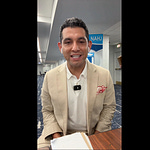From filmmakers to flower couriers, Angelenos are stepping up to protect their neighbors—quietly, defiantly, and at great personal risk.
By Nick Valencia
LOS ANGELES — Jorge Xolalpa Vazquez never planned to become an activist. A filmmaker by trade and a property manager by necessity, his life until recently was about keeping his head down and telling stories that might one day make it to the big screen. But when federal agents rolled into his neighborhood near Union and 23rd, everything changed.
“It kind of caught me off guard,” he told me. “My neighbors were panicking, running everywhere. It was chaos.”
What started as a single moment of confusion on a quiet Friday morning has since become a calling. Jorge, a DACA recipient and openly gay man, has found himself documenting the undocumented—sharing ICE sightings, amplifying the voices of those targeted, and putting his own safety on the line to help people understand what’s happening in his city.
“Of course I’m afraid,” he said. “I know I’m a target—for a lot of reasons. But I’m not going to stop.”
A New Kind of Frontline
In the weeks since ICE raids began sweeping across Los Angeles, the stories have grown darker. Agents using explosives to breach homes. Street vendors disappearing mid-shift. Hospital staff silenced. Alleged bounty hunters operating unchecked.
And yet, amid that fear, something else is taking root: a decentralized resistance—quiet, improvisational, and deeply human.
It looks like Jorge, refusing to be silent.
It also looks like Norma Aviña.
Norma isn’t on the frontlines with a camera. She’s not chasing down raids or broadcasting viral videos. But what she’s doing might be just as radical: buying out entire shifts of street vendors so they don’t have to risk deportation just to make ends meet.
“I’ve seen firsthand how vital our street vendors are to the heart of our community,” she told me. “These are hard-working people—mothers, fathers, young entrepreneurs—who wake up before dawn to make an honest living. But with the recent raids, many are afraid to even leave their homes.”
So she started a GoFundMe. No major nonprofit backing. No blue check by her name. Just a neighborhood organizer and a simple idea: buy people time.
“Our goal is to give them a temporary safety net. So they can stay home, avoid unnecessary risk, and return to their businesses when it’s safe,” she said. “This isn’t just about donations—it’s about dignity.”
Halfway to her goal already, aside from buying out food carts, she’s been taking the flowers she buys from street vendors and delivering them to local seniors at convalescent homes. Another quiet act of defiance.
“Just trying to lift spirits,” she said.
“This Isn’t About Likes”
Jorge’s story has taken a more public turn. Since he began posting about raids on social media, his platform has exploded. But not all the attention has been welcome.
“I’ve received death threats. People saying they hope I get raped. Others trying to discredit me,” he said.
Jorge was the person who originally posted video of federal agents at Ronald Reagan UCLA Medical Center who refused to identify themselves.
“Some [trolls] claimed they knew I was lying. But I’d already spoken to over 20 nurses. I checked the story.”
What makes Jorge’s voice powerful isn’t just the facts—it’s the risk. He didn’t set out to be a citizen journalist. He set out to protect his neighbors.
“I turned off monetization,” he said. “This isn’t about likes or reviews or money. This is about people getting informed.”
That decision came at a cost. He no longer goes out much. He’s wary even walking to the gym. “I’ve been making films for ten years,” he said. “But people don’t recognize me for that. They recognize me from TikTok.”
Silence, and What It Costs
Jorge says what hurts most isn’t the threats—it’s the silence from those who could speak out but don’t.
“I left a group chat with 100 very powerful Latinos,” he told me. “I asked what we were doing to help—and nobody responded. These are people always asking for letters to renew their visas or green cards. And when it came time to stand up, they vanished.”
He’s also seen the divide inside the Latino community sharpen.
“Some people would rather walk on their whiteness and not get involved. They think it doesn’t affect them. But it does. We’re just not standing up for each other.”
“This Is a Reckoning”
A source I’ve spoken with knowledge of ICE operations used one word to describe what’s happening: a reckoning. He said the agents on the ground feel emboldened—free to operate without consequence, protected by a political climate that treats immigrants as criminals by default.
Jorge doesn’t disagree.
“I actually miss the Bush administration,” he said. “At least they wouldn’t post memes of ICE agents with alligators and captions like ‘We’re coming for you.’ This isn’t law enforcement anymore. It’s humiliation.”
Even more disturbing: the emergence of fake ICE agents. Jorge recently posted about a woman named Juliana—an undocumented mother who, after refusing voluntary deportation, was reportedly handed over to bounty hunters.
“Now she’s missing,” he said. “Her family says she’s diabetic and hasn’t been heard from since. No one knows where she is.”
A City Holding Its Breath
There’s a growing sense of unease across Los Angeles. People are disappearing, not just into detention centers—but from sidewalks, street corners, parking lots. Fear is creating space where culture once thrived.
And yet, even in that silence, there is resistance.
It’s Norma, with her flowers and fundraising.
It’s Jorge, risking it all to tell the truth.
It’s every neighbor who brings water to a vendor, every mother who employs undocumented labor, every passerby who records what law enforcement doesn’t want seen.
They may not be able to stop what’s happening. But they can bear witness. And they refuse to look away.












Share this post